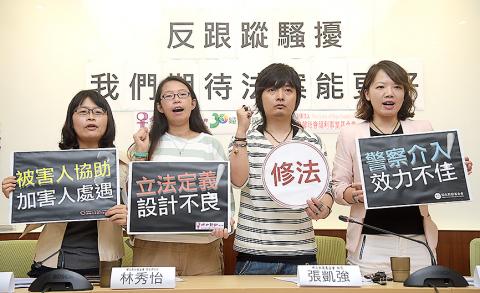The Executive Yuan needs to refine its draft anti-stalking act to broaden the range of pestering behavior covered and shorten the specified time frame for police investigations into complaints, women’s rights groups said yesterday.
While they support the idea of the bill, they said its current version would not provide enough protection to people who are being harassed or stalked.
Lawmakers on the legislature’s Internal Administration and Social Welfare and Environmental Hygiene committees yesterday questioned Ministry of the Interior officials over the draft approved by the Executive Yuan.

Photo: Huang Yao-cheng, Taipei Times
The draft defines “pestering behavior” as a person’s actions toward others, be it a specific individual or their families, spouses or those have close relations with them, out of “admiration, affection or resentment” cause the focus of the attention to feel disgusted or fearful.
The draft act lists seven types of pestering behavior: spying; stalking; repeatedly making telephone calls or sending messages to a person on a withheld number; persistently requesting dates; sending or exhibiting messages, images, sound, videos or other things to a person; menacing a person by showing things that could hurt their reputation; or using contact information to purchase unsolicited and unwanted items for a person.
If someone is being stalked by a stranger, they can hardly know and therefore prove the stalker’s motivation, Awakening Foundation director of development Lin Shiou-yi (林秀怡) told a news conference at the Legislative Yuan in Taipei.
Once a person files a complaint with police, the police are required to spend three months investigating the allegations, which is both time consuming and fails to provide a victim with timely protection, Taipei Women’s Rescue Foundation deputy chief executive Jasmine Bai (白智芳) said.
Police should finish a preliminary investigation into a complaint within 72 hours, and if the allegations are confirmed, they should issue a 10-day protection order that forbids a harasser from pestering the complainant during that time, she said.
However, Deputy Minister of the Interior Chiu Chang-yueh (邱昌嶽) told lawmakers during yesterday’s committee session that victims would not need to verify their harasser’s motivation before contacting police, because the police would start probing a case as soon as they received a victim’s complaint.
Police would first give a warning to the alleged harasser, and if the harasser is found to be pestering the complainant again within two years, police would ask the court for a protection order for the victim, he said.
Chinese Nationalist Party (KMT) Legislator Alicia Wang (王育敏) urged the ministry to allow police to issue a 10-day protection order to curb alleged harassers.
However, Chiu said that the suggestion could face legal issues and so it would need further consideration.

Chinese Nationalist Party (KMT) Chairman Eric Chu (朱立倫), spokeswoman Yang Chih-yu (楊智伃) and Legislator Hsieh Lung-chieh (謝龍介) would be summoned by police for questioning for leading an illegal assembly on Thursday evening last week, Minister of the Interior Liu Shyh-fang (劉世芳) said today. The three KMT officials led an assembly outside the Taipei City Prosecutors’ Office, a restricted area where public assembly is not allowed, protesting the questioning of several KMT staff and searches of KMT headquarters and offices in a recall petition forgery case. Chu, Yang and Hsieh are all suspected of contravening the Assembly and Parade Act (集會遊行法) by holding

PRAISE: Japanese visitor Takashi Kubota said the Taiwanese temple architecture images showcased in the AI Art Gallery were the most impressive displays he saw Taiwan does not have an official pavilion at the World Expo in Osaka, Japan, because of its diplomatic predicament, but the government-backed Tech World pavilion is drawing interest with its unique recreations of works by Taiwanese artists. The pavilion features an artificial intelligence (AI)-based art gallery showcasing works of famous Taiwanese artists from the Japanese colonial period using innovative technologies. Among its main simulated displays are Eastern gouache paintings by Chen Chin (陳進), Lin Yu-shan (林玉山) and Kuo Hsueh-hu (郭雪湖), who were the three young Taiwanese painters selected for the East Asian Painting exhibition in 1927. Gouache is a water-based

Taiwan would welcome the return of Honduras as a diplomatic ally if its next president decides to make such a move, Minister of Foreign Affairs Lin Chia-lung (林佳龍) said yesterday. “Of course, we would welcome Honduras if they want to restore diplomatic ties with Taiwan after their elections,” Lin said at a meeting of the legislature’s Foreign Affairs and National Defense Committee, when asked to comment on statements made by two of the three Honduran presidential candidates during the presidential campaign in the Central American country. Taiwan is paying close attention to the region as a whole in the wake of a

OFF-TARGET: More than 30,000 participants were expected to take part in the Games next month, but only 6,550 foreign and 19,400 Taiwanese athletes have registered Taipei city councilors yesterday blasted the organizers of next month’s World Masters Games over sudden timetable and venue changes, which they said have caused thousands of participants to back out of the international sporting event, among other organizational issues. They also cited visa delays and political interference by China as reasons many foreign athletes are requesting refunds for the event, to be held from May 17 to 30. Jointly organized by the Taipei and New Taipei City governments, the games have been rocked by numerous controversies since preparations began in 2020. Taipei City Councilor Lin Yen-feng (林延鳳) said yesterday that new measures by